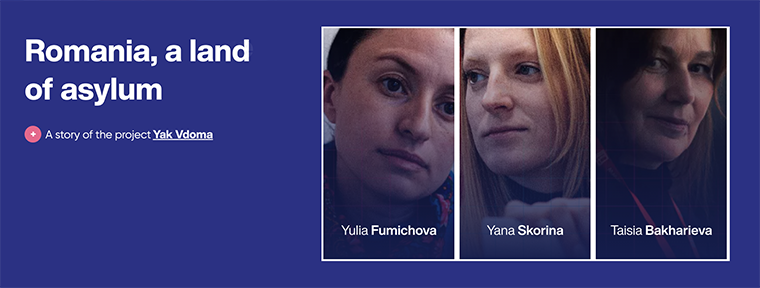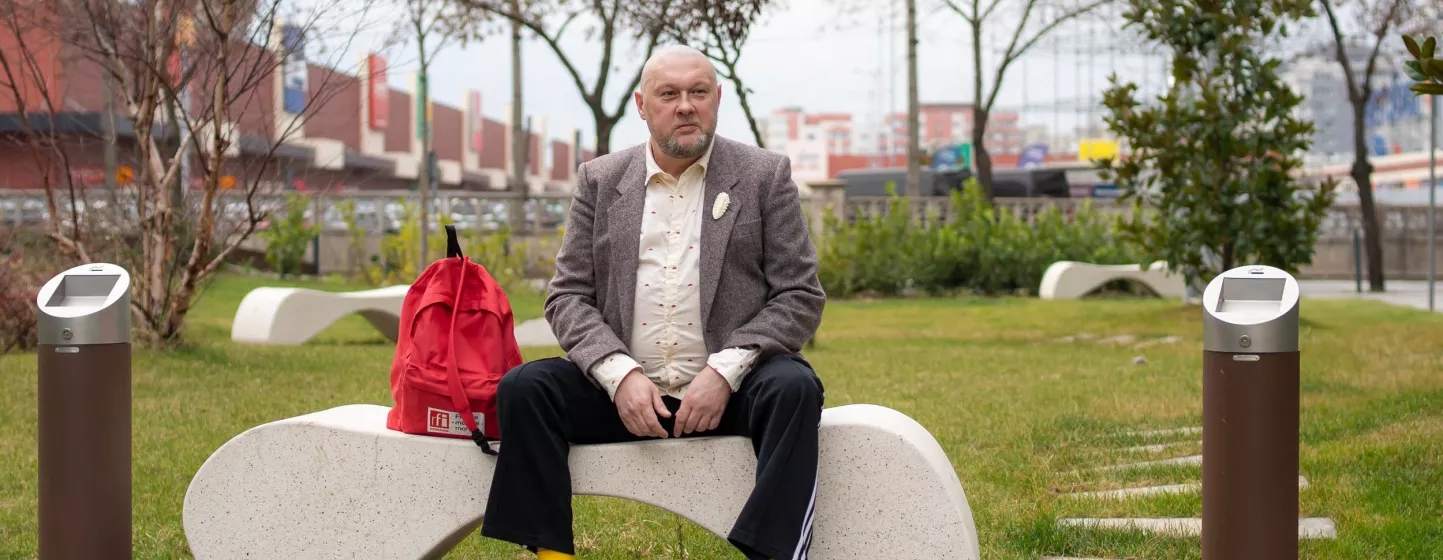Konstiantyn Doroshenko, artist-in-resistance
The Yak Vdoma project's only male resident, art critic and curator Konstiantyn Doroshenko wants to write a book about Ukraine's artistic effervescence at a time of war.
"I learnt French at school and spoke it well. My level was so good that I skipped classes at university. It was only when I started to visit France that I realised I didn't actually know a thing..." Konstiantyn jokes to our French correspondent at the start of the interview.
Sharp-witted, his eyes sparkle and his tone is benevolent. You quickly sense that Konstiantyn has the good manners of someone who knows how to appreciate the good times. Being here in the Romanian capital is one of those good times. Konstiantyn's desire to come here dates back to his childhood in the 1980s, to the newspaper he edited at school, which was devoted to the Romania of Ceauşescu. “A real hero in the Soviet Union," he dares to add.
When we point out to him that Ceauşescu was known to have distanced himself from Moscow, he nods with a smile, as if to signify that he had already chosen his side 35 years ago.
Konstiantyn's presence in Bucharest it seems, was a foregone conclusion. And when a friend told him about this residence, he jumped at the chance. We can easily picture this sturdy, bald fellow, with his mischievous smile, striding around the city in a nice suit and shirt, an indispensable brooch pinned to his chest, blue and yellow socks in the colours of his country, touring Ceauşescu's palace as soon as he arrived.
"One of the most beautiful monuments in the world," he states, without us really understanding if he is cracking a joke again or not.
Combating the Russification of Ukrainian culture
Here to write a book on art in Ukraine at a time of war, Konstiantyn knows better than anyone that he has hit bullseye in Bucharest when it comes to totalitarianism. The city still bears the scars of Ceauşescu's dictatorship everywhere. So, we ask him about the Russification of his own country. Particularly fitting given that since 2022 he has been a member of the committee of experts of the Ministry of Culture, Information and Politics responsible for "combating the consequences of Russification and totalitarianism." A ceremonious name perhaps, but a key issue for Ukrainians today.
Konstiantyn unfolds the sequence of events: "People started with Lenin in 2014. It was called 'Leninopad': toppling the busts of Lenin, the man behind the worst horrors of the 20th century, a man who never set foot in Ukraine..." he makes clear. Since last year, the movement has grown, extending to all representatives of Russian culture that people want to see disappear from the public arena.
The art critic uses an animal metaphor to describe Russian imperialism: "it's like a cat that pees somewhere to mark its territory, that's what the Russians do so that other cats don't come sniffing around too closely. The Russian Empire, followed by the Soviet Union, marked their territory with street names and busts. But today, Ukraine wants to rewrite its own history," thunders the colossal Konstiantyn, suddenly more serious.
He believes that the tragedies at Bucha and Irpin have had a detonating effect on Ukrainian public opinion. It was there, in particular, that he realised that "all these monuments to Gorky, Pushkin and Tchaikovsky could traumatise Ukrainians and that they had to be demolished." However, Konstiantyn wants his country to conserve them "in museums and special parks so that we can study the history of Russian propaganda," he explains, already focused on the future.
Ukrainian culture increasingly exported to Europe
Yet what excites this influential art critic more than anything is Ukrainian culture today, at a time of war. Currently a curator at the renowned PinchukArtCentre, he organises exhibitions at the centre and coordinates research into contemporary art.
Here again, neighbouring Russia gets a dressing down: "Under the Soviet Union, our ideologists would put conservative ideas into our heads, but Ukrainian contemporary art is demonstrating that society is not limited to this single vision".
The book Konstiantyn is preparing on this effervescence, and which he has come to add the finishing touches to here in Bucharest, is due to be published this year. Ukrainian culture is in the spotlight, gaining international attention and recognition. For example, Ukrainian modernism is on show in Madrid and groups such as Kalush Orchestra and DakhaBrakha are touring Europe. Konstiantyn even attended a concert by Ukrainian superstar Verda Serduchka in Bucharest.
In his opinion, "the war has given even greater vigour to Ukrainian art. The first month was a total shock for everyone, but then people began to understand that art must give meaning to all that occurs. Those who are fighting are doing so to ensure that life goes on in this country - and the essence of life is in culture."
Konstiantyn lists artistic residencies, festivals and initiatives – often organised with the support of European institutions, to whom he extends his warmest thanks – aimed at encouraging young people's creativity in major cities and elsewhere. You can feel his admiration for this boom and its vivacious energy. "In the 1980s when I was young, there was only one informal place for non-conformists in Kiev, and there were only a handful of us. Today there are different places and people everywhere, the change is fascinating."
A culture of diversity, the opposite of Russian state culture
It's a welcome mix of modern themes and values: freedom of expression, gender equality, LGBTQI+ rights, inclusion of minority groups, and more. Values that are not imposed by anyone.
In his opinion, "this is just how these young people are: creative and in favour of diversity. Nobody tells them what to do, they are inspired by what they see on the internet and social networks. It lets you travel the world without a visa and become an ambassador for the subculture of your choice, without being in conflict with anyone else. On the contrary, it's all intertwined."
And you can feel that it is a breath of fresh air for Konstiantyn – for him and for the whole country.
The process of opening up and infusing vitality that Konstiantyn describes is a contrast to his perception of their Russian neighbour, whose artists "have become decorative elements serving the regime. State violence is rooted in Russian culture itself. It reflects the dehumanisation of society, and that should not be a prospect for Ukrainians," he asserts, by way of conclusion.

